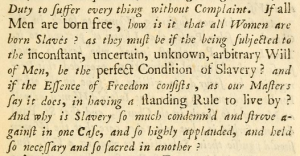
Friendship as a Means to Freedom
By Allauren Forbes (University of Pennsylvania, Philosophy)
Date: Tuesday 4th February, 2020
Time: 1640-1800
Place: H-232
Abstract: Friendship has been a subject of interest to Western philosophy since at least Plato and Aristotle, and the women thinking and writing about friendship in the Early Modern period did so within a context indebted to these traditions. This context was, however, deeply anti-women: real friendship was often claimed to be beyond the grasp of women, for women were inferior to men. However, some women philosophers – including Marie le Jars de Gournay, Mary Astell, and Gabrielle Suchon – wrote about friendship in ways that both emerge from the history of Western philosophy and yet which resist this inegalitarian framework. For these three philosophers, real friendship represents a means to obtain meaningful freedom. This is, at its core, a feminist project. Gournay, Astell, and Suchon all take a tradition that manifested the claims of their inherent inferiority and use it to suggest that women are not only (at least) potentially equal to men, but also that friendship itself can bring about the very good – freedom – that a patriarchal system would deny to them. Notably, though, each of these three philosophers conceives of the kind of freedom facilitated by friendship in a slightly different way. For Gournay, friendship supports a kind of epistemic freedom; Astell’s account of friendship promotes a moral sense of freedom; and Suchon shows that friendship is a necessary feature of a more straightforwardly political sense of freedom.
About the speaker: Allauren Forbes is a doctoral candidate at the University of Pennsylvania. Her research focuses on transformative relations like friendship, marriage, and education and how they underwrite one’s intellectual and political capacities in early modern philosophy. She is also interested in contemporary questions of feminist philosophy and bioethics, particularly in the ethics of surrogacy and its impact on women’s agency, and in questions in technology, especially as are relevant to democratic institutions. She has published in the journal Hypatia, as well as book chapters in the Routledge Handbook on Early Modern Women and in Reconsidering Political Thinkers (OUP).
